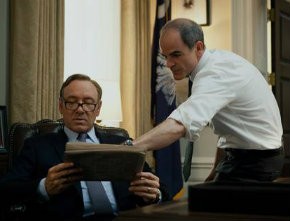House of Cards has become a less funny, even less realistic The West Wing

So I got through the latest season of House of Cards, in which scheming politician Frank Underwood is finally president. I won’t quite say I enjoyed most of it; it was just that thing where you’re motivated to stick with a show once you’ve started it. Alessandra Stanley articulates the conventional wisdom: House of Cards is less fun now that Underwood is the most powerful person in the world, because governing is less interesting to watch than jockeying for power is.
Maybe. But this doesn’t really account for the counterexample of The West Wing. That show had a little backstage intrigue and, later on especially, a good bit of campaigning. Its bread and butter, however, was governance—including quite a lot of policy and procedural detail. And even at its weakest it was almost always more fun to watch than House of Cards.
Now, every show about national politics brings to mind The West Wing as a point of comparison and, especially, contrast. But if The West Wing has a true antithesis, House of Cards is it. Both shows are obsessed with presidential power, prestige, and glamour. But while the one is an optimistic, patriotic romance (on network), the other is a far darker Washington dystopia (on Netflix). Two brilliant presidents, one who inspires like a proper network-drama hero, another who horrifies like the late-period cable antihero he more or less is. Based on that summary alone, The West Wing’s advantages are obvious: more feels, less murder.




